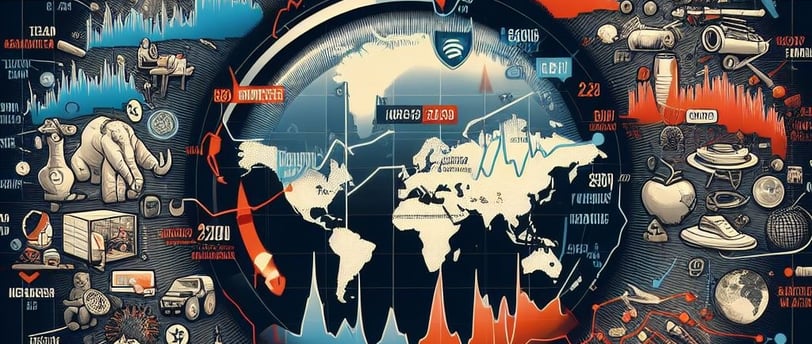The Dynamic Impact of Global Events on Stock Market Volatility: A Comprehensive Guide


Introduction
Stock market volatility is a common phenomenon that can be influenced by a variety of factors. While economic indicators and company performance are important drivers of market fluctuations, global events also play a significant role in shaping investor sentiment and market behavior. In this comprehensive guide, we will explore the dynamic impact of global events on stock market volatility and how investors can navigate through market uncertainties with greater confidence.
Understanding Global Events
Global events encompass a wide range of occurrences that can have both direct and indirect effects on the stock market. These events can include geopolitical tensions, economic announcements, natural disasters, political crises, and technological advancements. It is important for investors to stay informed about these events as they can trigger fluctuations in the market.
Geopolitical Tensions
Geopolitical tensions refer to conflicts and disputes between countries or regions. These tensions can arise due to territorial disputes, trade wars, political disagreements, or military actions. When geopolitical tensions escalate, they can create uncertainty in the market, leading to increased volatility. Investors often react to these events by selling off their holdings or adopting a more cautious approach, which can further amplify market fluctuations.
Economic Announcements
Economic announcements, such as GDP growth rates, inflation figures, interest rate decisions, and employment data, have a direct impact on the stock market. Positive economic news can boost investor confidence and lead to a rise in stock prices, while negative economic news can have the opposite effect. Investors closely monitor these announcements and adjust their investment strategies accordingly.
Unforeseen Crises
Unforeseen crises, such as natural disasters, terrorist attacks, pandemics, or financial market meltdowns, can have a profound impact on stock market volatility. These events are often unpredictable and can cause widespread panic among investors. During such crises, stock prices can experience sharp declines as investors rush to sell their holdings. However, these events can also create investment opportunities for those who are able to identify undervalued stocks.
The Immediate Effects of Global Events
When global events occur, the stock market typically reacts in the short term. The immediate effects of these events can be seen in increased trading activity, higher volatility, and significant price movements. Investors may experience heightened emotions, such as fear or greed, which can influence their decision-making process.
Market Reaction to Geopolitical Tensions
Geopolitical tensions can have a direct impact on certain industries or sectors. For example, an increase in tensions in the Middle East may lead to higher oil prices, which can negatively affect airline stocks. Similarly, trade disputes between major economies can impact companies that rely heavily on international trade. Investors often monitor geopolitical developments and adjust their portfolios accordingly to mitigate potential risks.
Market Reaction to Economic Announcements
Economic announcements are closely watched by investors as they provide insights into the health of the economy. Positive economic news, such as strong GDP growth or low unemployment rates, can lead to a bullish market sentiment. Conversely, negative economic news, such as a recession or rising inflation, can create a bearish sentiment. Investors may adjust their investment strategies based on these announcements to capitalize on market trends.
Market Reaction to Unforeseen Crises
During unforeseen crises, the stock market can experience significant volatility. Investors often react by selling off their holdings, seeking safe-haven assets, or adopting a wait-and-see approach. However, it is important to note that market reactions to crises can vary depending on the nature and severity of the event. For example, during the COVID-19 pandemic, certain sectors, such as technology and healthcare, experienced growth, while others, such as travel and hospitality, suffered significant declines.
Long-Term Investment Implications
While global events can trigger short-term market volatility, it is important for investors to take a long-term perspective. Over the long term, the stock market tends to recover from downturns and deliver positive returns. Understanding the long-term investment implications of global events can help investors make informed decisions and stay focused on their financial goals.
Diversification and Risk Management
Global events highlight the importance of diversification and risk management in an investment portfolio. By diversifying across different asset classes, sectors, and regions, investors can reduce their exposure to specific risks associated with global events. Additionally, implementing risk management strategies, such as setting stop-loss orders or regularly rebalancing the portfolio, can help mitigate potential losses during periods of market volatility.
Opportunities for Value Investing
Global events can create opportunities for value investors to identify undervalued stocks. During market downturns, stock prices may be driven down by panic selling, presenting buying opportunities for those who believe in the long-term potential of certain companies. Value investors analyze fundamental factors, such as earnings growth, cash flow, and competitive advantages, to identify stocks that are trading below their intrinsic value.
Adapting to Changing Market Conditions
Global events can lead to shifts in market dynamics and investor sentiment. Successful investors are able to adapt to changing market conditions and adjust their strategies accordingly. This may involve reallocating assets, identifying new investment opportunities, or taking a defensive approach during periods of heightened volatility. Staying informed, conducting thorough research, and seeking professional advice can help investors navigate through market uncertainties.
Conclusion
Global events have a dynamic impact on stock market volatility. Geopolitical tensions, economic announcements, and unforeseen crises can trigger fluctuations in the market and influence investor sentiment. By understanding the immediate effects of these events and considering their long-term investment implications, investors can navigate through market uncertainties with greater confidence. Diversification, risk management, value investing, and adaptability are key strategies that can help investors weather market volatility and achieve their financial goals.
